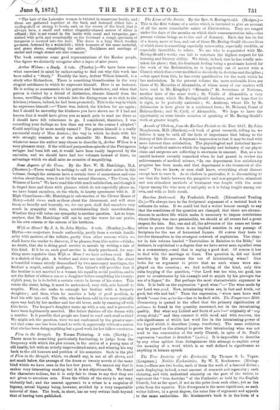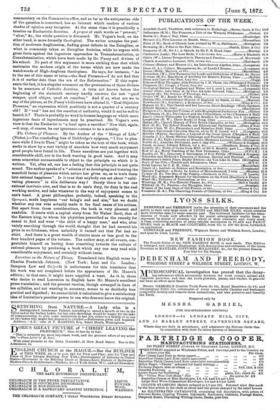The True Doctrine of the Eucharist. By Thomas S. L.
Vegan. (Longman.) Notitia Euchoristica. By W. E. Scudamore. (Riving- tons.)—Here are two books, each of them the work of a learned divine ; each displaying, indeed, a vast amount of research and ingenuity ; each claiming, and with undoubted sincerity on the part of the writer, to represent the "true doctrine "of the Eucharist, as held by the English Church, but as far apart, if not as the poles from each other, yet as the poles from the equator. This divergence is the more significant, as each writer follows, in a great degree, the same line of argument and appeals to the same authorities. Mr. Soudamore's book is in the form of a commentary on the Communion office, and as far as the antiquarian side of the question is concerned, has an interest which readers of various shades of opinion may recognise. At the same time it is practically a treatise on Eucharistic doctrine. A propos of such words as "present," "altar," &c., the whole question is discussed. Mr. Vogan's book, on the other hand, is more formally theological. The writer occupies the posi- tion of moderate Anglicanism, finding great defects in the Zuinglian, or what is commonly taken as Zuinglian doctrine, while he argues with great force against the ingenious approaches to Transubstantiation, or Consubstantiation, which have been made by Dr. Pusey and divines of his school. No part of this argument is more striking than that which maintains the modern origin of the terms which are now made the watchwords of High-Anglican theologians. He says, for instance, "As to the use of this name or term—the Real Presence—I do not find that it is of earlier date than the era of the Reformation." If this repre- sents the fact, it is a singular comment on the pretensions of these divines to be assertors of Catholic doctrine. A term not known before the beginning of the sixteenth century hardly answers the test "quod semper, quod ubique, quod ab omnibus." And if so, what are we to say of the phrase, as Dr. Posey's followers have altered it, "Real Objective Presence," an expression which positively is not a quarter of a century old ? If " real " has not the sanction of authority, would it notbe well to banish it ? There is probably no word in human language on which more ingenious feats of legerdemain may be practised. Mr. Vogan's own view is that the Eucharist is "a feast upon a sacrifice." Now that, again, —it may, of course, be our ignorance—seems to us a novelty.



































 Previous page
Previous page